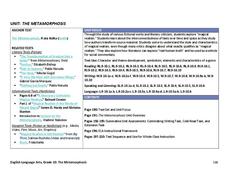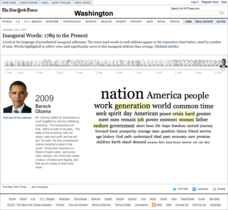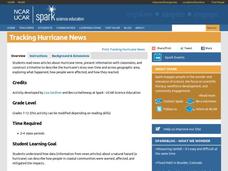Building Evidence-Based Arguments: Grade 9
High schoolers investigate the dilemma of a proportional response with a lesson about the history of terrorism and militant extremists in the United States. As they examine memos from the FBI and speeches from President Bush and Obama,...
Echoes & Reflections
Jewish Resistance
Resistance to the Holocaust took on many forms. Learners explore the passive and active resistance of Jewish people who continued their practices and observances, as well as organized resistance against the evils of the Nazis. An...
Echoes & Reflections
The "Final Solution"
Nazi policies shifted from deportation and imprisonment to extermination of the Jewish people in death camps in the "Final Solution." Learners examine photos of artifacts, read poetry written by survivors, analyze testimony from...
Echoes & Reflections
Survivors and Liberators
The end was just the beginning. The period immediately after the end of World War II and the Holocaust is often called "The Return to Life" as survivors looked to reunite and recreate broken families and shattered lives. A two-lesson...
Echoes & Reflections
Nazi Germany
The Holocaust was an evolution of anti-Semitism, scapegoating, and targeted violence against Jews with Nazi policies. A resource unpacks the escalation in violence, along with the erosion of democratic institutions, during the 1930s....
Echoes & Reflections
The Children and Legacies Beyond the Holocaust
Using video testimony, primary source documents that detail international agreements, and structured discussions, learners consider the precarious position of children during the Holocaust and other international conflicts, and how to...
Echoes & Reflections
Rescuers and Non-Jewish Resistance
What does it mean to be a rescuer during the time of the Holocaust? Learners consider the role of those who resisted the Nazi invasions, including hiding Jewish people, throughout Europe. Activities include listening to the testimony of...
Echoes & Reflections
The Ghettos
Young historians examine primary sources, including diaries, poems, and photographs, to consider the conditions in the ghettos and how they fit into the escalation of the Third Reich's plot against the Jewish people.
Echoes & Reflections
Studying The Holocaust
While many young scholars are familiar with the Holocaust, they may not understand the specific history that led to the unprecedented atrocity. The first lesson in the unit helps teachers gauge their pupils' background knowledge. A...
California Department of Education
Plagiarism is Stealing!
Stop, thief! Do your pupils understand the consequences of plagiarism? Lesson three of six in a series of college and career readiness activities demonstrates the dangers of taking credit for someone else's work. Learners engage in...
Constitutional Rights Foundation
U.S. Immigration Policy and Hitler’s Holocaust
Though the Statue of Liberty welcomes political refugees to her shores, the welcoming sentiment has not always been reflected in the American citizenry. High schoolers read about the regrettable period in United States history...
Bill of Rights Institute
Preserving the Bill of Rights
Consider how America's founding fathers and their experiences contributed to the rights we all enjoy today. A collection of reading, writing, and collaborative exercises prompt high schoolers to think about the ways their current lives...
Louisiana Department of Education
The Metamorphosis
How can something be true even if it didn't happen? Invite your classes to investigate the truths found in the world of magical realism as they analyze short stories, poems, informational texts, video, and art from this genre.
Media Education Lab
The Ethics of Propaganda
What are the short and long-term consequences for consumers and producers of modern media propaganda? Class members ponder this essential question as their unit study of ethics of propaganda concludes. After examining two case...
Media Education Lab
Understanding Viral Messages
Imagine advertising for a product but not being paid to do so. Welcome to the world of Viral Messaging. Class members first view a T-Mobile flash mob video that went viral and has been seen by over 14 million viewers. After analyzing the...
Media Education Lab
Propaganda in Context
"Board Game Helps Fight Real World Ebola," a video produced by Voice of America, provides the text for a guided instructional activity that asks viewers to analyze the propaganda techniques used in the video. Groups then select a example...
University of California
Equal Rights? The Women's Movement from Suffrage to Schlafly
If you've never heard of the Equal Rights Amendment, it's probably because there isn't one in the United States Constitution. Delve into the contentious history behind the ERA, its founders and supporters, and reasons for its political...
The New York Times
Inaugural Words: 1789 to the Present
One of the reasons presidential inaugural speeches are so inspiring is the way word choice reflects the historical context of the time. An interactive timeline invites learners to click on their president of choice and view the most...
US Department of Education
A Close Reading of Lincoln’s Gettysburg Address
Abraham Lincoln's Gettysburg Address provides the text for a series of close reading exercises that model for instructors how carefully crafted guiding questions can help readers think critically about what they read, thus developing...
Common Sense Media
Private Today, Public Tomorrow
What responsibility do we have to protect the privacy and safety of others when posting information about them online? This is an essential activity for every learner today experiencing their social and professional worlds in an online...
Office of Disease Prevention and Health Promotion
Eat Healthy • Be Active Community Workshops
Recipe makeovers, healthy alternatives, quick tips for a nutritious lifestyle...this 187-page document has it all! Don't miss a thorough packet of workshop activities and handouts designed to support your teaching of the...
Federal Reserve Bank
Cash the Check and Track the Dough
From checking and savings accounts to learning the importance of maintaining records and balancing a bank account, prepare your high schoolers to become financially independent and savvy adults, and explore all the intricacies of owning...
Visa
Money Matters: Why It Pays to Be Financially Responsible
What does it mean to be financially responsible? Pupils begin to develop the building blocks of strong financial decision making by reviewing how their past purchases are examples of cost comparing, cost-benefit analysis, and budgeting.
Center Science Education
Tracking Hurricane News
Here is a unique twist for your lesson on hurricanes. After examining extreme weather news headlines, your storm chasers view a PowerPoint about hurricanes and then zoom in on Hurricane Irene. They map a timeline of her trek up the East...

























